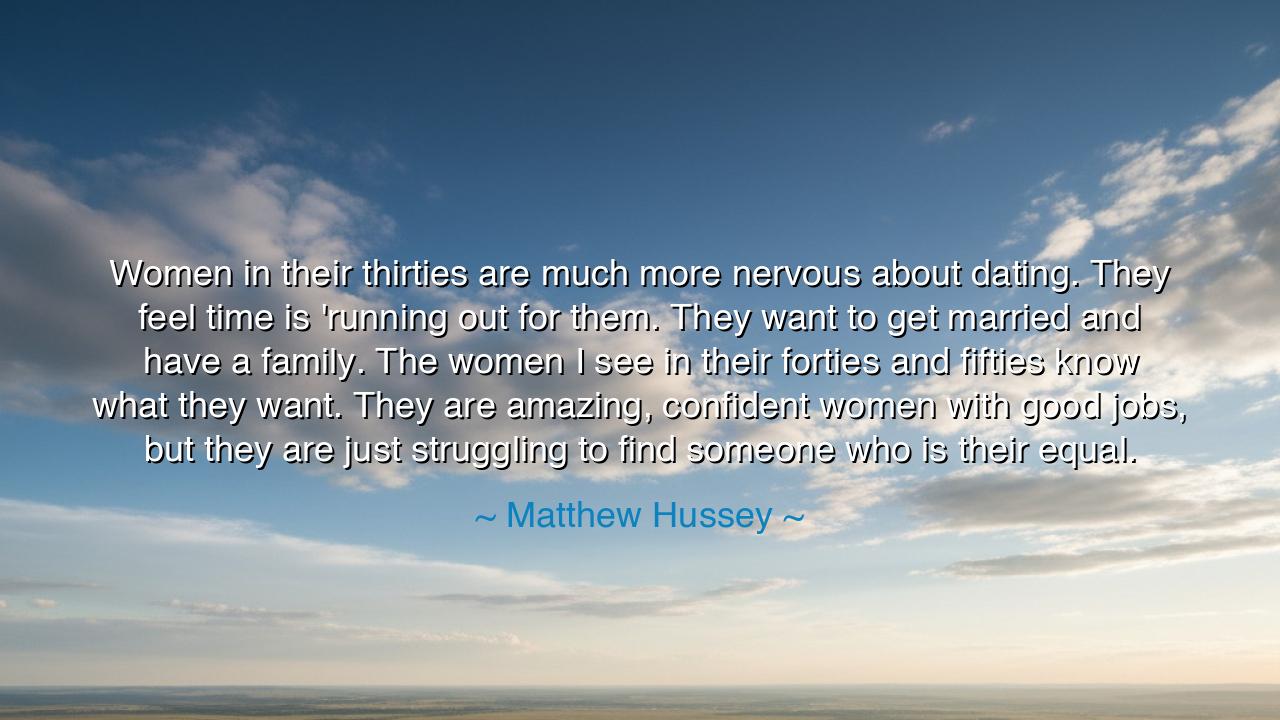
Women in their thirties are much more nervous about dating. They
Women in their thirties are much more nervous about dating. They feel time is 'running out for them. They want to get married and have a family. The women I see in their forties and fifties know what they want. They are amazing, confident women with good jobs, but they are just struggling to find someone who is their equal.






In the marketplace of hearts, where seasons turn like pages, Matthew Hussey speaks a layered truth: “Women in their thirties are much more nervous about dating. They feel time is running out for them. They want to get married and have a family. The women I see in their forties and fifties know what they want. They are amazing, confident women with good jobs, but they are just struggling to find someone who is their equal.” Hear how his words trace a pilgrimage—from urgency to clarity, from proving oneself to requiring reciprocity. He is not passing judgment; he is mapping a weather pattern many have felt: the clock’s drum in one decade, the compass’s calm in the next.
Let us weigh the first movement of his saying. In the bright press of the thirties, many feel the sand slipping in the glass: careers ascendant, friendships branching, and the body’s mysteries whispering of calendars. The soul wants the simple, radiant things—to get married, to gather a family—yet the path is braided with modern delays and decisions. Thus the heart grows nervous in dating: every coffee stirs questions of destiny; every silence hums like a verdict. This is not weakness; it is arithmetic meeting longing. Time, a fine teacher, is also an insistent one.
Now consider the second movement. In the forties and fifties, many arrive with a different posture: they know what they want. Having tested ladders and crossed rivers, they carry the authority of lived choosing. They are amazing, confident, anchored by good jobs or sturdy callings; they have refined their taste for peace over drama, substance over spectacle. Their challenge is not self-doubt but the struggle to find someone who stands level with them—an equal in values, pace, and depth. The question shifts from “Will I be chosen?” to “Will we choose each other well?”
A story, then, to place flesh on these bones. Two friends—call them Linh and Mara—began together at twenty-two. At thirty-two, Linh felt the cymbal of the clock. She dated with a knot in her chest, hearing in every second date the echo of “Is this my future child’s father?” Her laughter was real, but burdened. She learned to pause, to name her hopes without apology, and to release what did not answer them; soon the knot loosened, and clarity replaced panic. At forty-seven, Mara returned to the search after a long devotion to work and kin. No longer auditioning, she honored her own thresholds—conversation that nourished, kindness that persisted, curiosity that matched hers. Suitors admired her light; some tried to dim it. She let those pass. And though the road was quieter, it was truer: she sought not rescue, but resonance.
History repeats this wisdom in older dress. Abigail Adams, writing across miles to John, did not plead for a savior; she required a partner—“Remember the ladies”—an equal in mind and moral aim. In myth, Penelope was lauded not for haste, but for steadfast discernment, weaving and unweaving until a worthy bond reappeared. Across centuries the counsel converges: let urgency inform you, but let discernment lead you; measure suitors not by noise or novelty, but by the fit of character and the proof of deeds.
The meaning beneath Hussey’s words, then, is not a cage but a compass. They remind us that different decades carry different winds: the thirties may gust with time running out; the forties and fifties may steady with “I know what I want.” Both seasons ask for the same core courage: to tell the truth about your desire and to protect the dignity of your days. The prize is not a pedestal but a partnership; not a timeline appeased, but a life shared with an equal who can carry joy and trouble side by side.
Practical counsel for pilgrims of every age: (1) Translate longing into criteria—write the five non-negotiables that guard your peace (kindness, accountability, shared aims, faithfulness, humor). (2) Date by rhythm, not panic—set a sustainable cadence of meetings that leaves room for reflection; urgency fogs discernment. (3) Ask futures-facing questions early (money habits, family hopes, conflict style, daily routines); clarity is kindness. (4) Audit for reciprocity—attention, effort, and repair should come from both sides; if you’re the only adult in the room, you’re not with an equal. (5) Protect your life force—sleep, friends, purpose; the person worthy of you will love the woman who keeps these, not the one who abandons them. (6) Reframe “struggling to find” as “refusing to settle”; strength is not loneliness—it is stewardship.
Finally, hold this blessing: whether you stand in the quickened air of the thirties or the settled light of the forties and fifties, you are allowed both tenderness and standards. The clock may tick; let it keep tempo, not tyranny. The compass may point; let it guide, not harden. And when you meet the one who listens, builds, and remains—who enters as a partner, not a project—then time itself will feel less like a pursuer and more like a friend walking with you into a home you both deserve.






AAdministratorAdministrator
Welcome, honored guests. Please leave a comment, we will respond soon